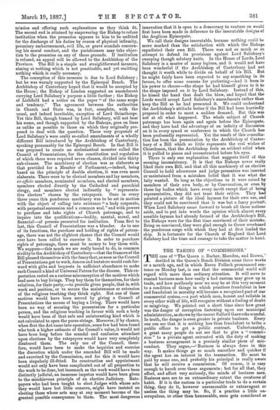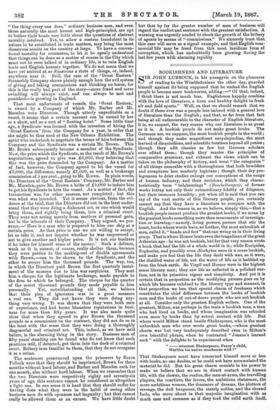THE TAKING OF "COMMISSIONS," fr HE case of "The Queen
v. Barber, Marsden, and Brown,"
decided in the Queen's Bench Division some three weeks or a month ago, and in which Baron Pollock pronounced sen- tence on Monday last, is one that the commercial world will regard with more than ordinary attention. It will serve to remind business men how easily a bad custom may grow up in trade, and how perilously near we may be at this very moment to a condition of things in which practices fraudulent in law and fraudulent in morality will become a recognised part of our commercial system,—a part which men, honest and reliable in every other walk of life, will recognise without a feeling of doubt or misgiving. We pointed out a short time since how great was the danger of corruption fastening upon our municipal administration, as shown by the recent Salford Gasworks scandal. In truth, the danger is even greater in private business. Every one can see that it is nothing less than fraudulent to bribe a public officer to get a public contract. Unfortunately, a great many people do not see that to give a " COMMiE. sion " to a private agent entrusted with the duty of making a business arrangement is a precisely similar piece of mis- conduct. They argue,—' Business is always done in this way. It makes things go so much smoother and quicker if the agent has an interest in the transaction. He must be paid by some one, and probably his principal is really aware that he will receive a commission.' Of course, it is easy enough to knock over these arguments ; but for all that, they affect, and affect very seriously, the minds of business men. Business men are to an extraordinary extent the creatures of habit. If it is the custom in a particular trade to do a certain thing, they do it, however unreasonable or extravagant or useless the thing may be. Bo, if a practice a little un- scrupulous, or other than honourable, once gets considered as "the thing every one does," ordinary business men, and even those naturally the most honest and high-principled, are apt to bother their heads very little about the questions of abstract morality involved. Yet, to allow a custom fraudulent in its nature to be established in trade matters, may bring the most disastrous results on the country at large. To have a conven- tional morality for commerce, to let it be openly understood that things can be done as a matter of course in the City which must not be even talked of in ordinary life, is to ruin English trade and English honesty together. We do not mean that we have yet arrived at so disastrous a state of things, or, indeed, anywhere near it. Still, the case of the 'Great Eastern' Steamship Company shows plainly enough how the evil system of giving and taking commissions and thinking no harm, for this is the really bad part of the story—mere fraud and mere swindling will always exist, and can always be met and punished—is growing in England.
That most unfortunate of vessels, the 'Great Eastern,' is owned by a Company of which Mr. Barber and Mr. Marsden were Directors. Though utterly unprofitable as a vessel, it seems that a certain amount can be earned by her as a show, and as a sort of "floating hotel." Some little time ago, a Syndicate was formed with the intention of hiring the Great Eastern' from the Company for a year, in order that she might be thus used at the New Orleans Exhibition. The agent who undertook to negotiate the terms of hire between the Company and the Syndicate was a certain Mr. Brown. This Mr. Brown subsequently became a member of the Syndicate. Now, the price which the Syndicate, as the result of Mr. Brown's negotiations, agreed to give was £6,000, they believing that this was the price demanded by the Company. As a matter of fact, however, the Company agreed to let the vessel for £5,000, the difference, namely £1,000, as well as a brokerage commission of 5 percent., going to Mr. Brown. In plain words, the Directors of the 'Great Eastern' Company, Mr. Barber and Mr. Marsden, gave Mr. Brown a bribe of .£1,000 to induce him to get his Syndicate to hire the vessel. As a matter of fact, the transaction was, for other reasons, not completed ; but this was what was intended. Yet it seems obvious, from the evi- dence at the trial, that the Directors did not in the least under- stand that they were doing a dishonest act, or one which would bring them, and rightly bring them, into a criminal court. They were not acting merely from motives of personal gain, but in the interests of their Company. They argued, we pre- sume,—' Here is a man who is prepared to hire our ship at a certain price. As that price is one we are willing to accept, let us take it, and not inquire whether he was empowered or not to give another and higher price. It is not our business if he takes for himself some of the money.' Such a defence, weak as it is, cannot, of course, really shelter them, because they were parties to the making-out of double agreements with Brown,—one to be shown to the Syndicate, and the other to secure him the thousand pounds. The way, too, in which the Directors paid Brown the first quarterly instal- ment of the moneys due to him was suspicions. They sent him a cheque for the legitimate brokerage, made payable to the firm to which he belonged. The cheque for the quarter of the secret thousand pounds they made payable to him personally. Yet, notwithstanding all this, we believe that their plea of ignorance was in a great measure a real one. They did not know they were doing any- thing very wrong. It was shown that they were both men of experience, and had borne blameless reputations in busi- ness for more than fifty years. It was also made quite clear that when they agreed to give Brown the thousand pounds as a commission on the contract, they did not do so in the least with the sense that they were doing a thoroughly disgraceful and criminal act. This, indeed, as we have said before, is the alarming thing in the story. Business men of fifty years' standing can be found who do not know that such practices will, if detected, get them into the dock of a criminal court. Bribery is so familiar to them, that they do not recognise it as a crime.
The sentences pronounced upon the prisoners by Baron Pollock were that they should be imprisoned, Brown for three months without hard labour, and Barber and Marsden each for One month, also without hard labour. When we remember that the two Directors were respectively eighty and seventy-six years of age, this sentence cannot be considered as altogether alight one. In one sense it is hard that they should suffer for having done what they were in the habit of seeing other business men do with openness and impunity ; but that cannot really be allowed them as an excuse. We have little doubt but that by far the greater number of men of business will regard the verdict and sentence with the greatest satisfaction. A warning was urgently needed to check the growth of the bribery of agents by means of" commissions." We sincerely trust that this case will serve as a signal example, and that English com- mercial life may be freed from this most insidious form of corruption, which has undoubtedly been growing during the last few years with alarming rapidity.



































 Previous page
Previous page